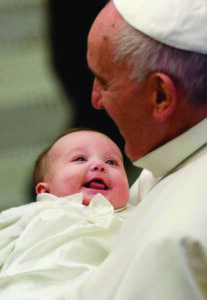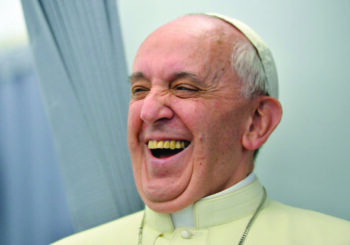Laugh Out Loud
Does God have a sense of humour? Some say “yes”. Some say “no”. Some say “I don’t know”. In a spoof he did about hell, comic Rowan Atkinson identified a group of inhabitants who were there because they laughed at the movie “The Life of Brian”. “No,” he admonished them, “God does not have a sense of humour”. On the other hand, a friend of mine had a large poster on her wall that proclaimed, “When God created man she was only joking”.
Those with insight may by now realise that I have a quirky humour that is not universally appreciated. From time to time, people have admonished me for laughing inappropriately. So, let’s get profound and theological - can theology be anything but profound? In an anthropomorphic sense, God must have a sense of humour because God made me in his image in likeness and I have a sense of humour. The fact that some may doubt that I have does not weaken the argument. Human beings laugh.
The gospels record that Jesus wept on three occasions. He was also familiar with laughter’s little sister, joy — there is no mention in the Gospels that he ever laughed. But I believe Jesus laughed every day. He could not have been the Son of God and the Son of Man if he did not laugh. Perhaps the evangelists just didn’t like his jokes.
The ability to laugh is a beautiful gift. No other sentient being known to humans is capable of it although I suspect my cat is capable of a sly grin from time to time. As with all God’s gifts, laughter can be used or misused. We are capable of cruel and cynical laughter. We can make fun of people and cause them to feel bad.
And, of course, there are times when mirth is inappropriate. There are seasons for weeping and seasons for laughing. But we don’t just laugh when we hear a joke. Reasonably frequently, we find ourselves laughing amid tears, not because something is funny, but because it brings relief. Tears and laughter are like identical twins; sometimes, we are not sure which is which.
 There are times when, for example, we are confronted with a compelling truth, that makes laughter well up from a deep cavern in our soul, a refreshing spring gushing forth to bring us life in the shadow of death. Laughter is not a denial of the pain and suffering. It is an admission of helplessness and our willingness to accept sadness, pain and suffering as part of creation without giving into desolation. “Well, all you could do was laugh”.
There are times when, for example, we are confronted with a compelling truth, that makes laughter well up from a deep cavern in our soul, a refreshing spring gushing forth to bring us life in the shadow of death. Laughter is not a denial of the pain and suffering. It is an admission of helplessness and our willingness to accept sadness, pain and suffering as part of creation without giving into desolation. “Well, all you could do was laugh”.
Laughter can also be a form of prayer. A friend recently sent me an email attachment. “This short clip is for anyone who loves coloratura sopranos and parrots. Do watch to the end. It’s only 55 seconds”, she said. Well, a coloratura soprano is not my artist of choice; I prefer Queen and Pink Floyd. And divas, in general, are not funny; not intentionally so anyway. But to humour my friend I dutifully watched. The soprano lady was a bit scary, and to a philistine like me, somewhat unintentionally funny. But the parrot! The parrot! He or she performed the same piece of music and executed it to perfection. I was engulfed by a tsunami of delicious laughter.
The first and obvious lesson to draw from this experience is that when you pray, don’t give up too soon. Jesus often keeps the best wine until last. The second, perhaps debatable lesson, is that laughter is a form of contemplation. It is a moment of ecstasy. Your whole person, mind, body, emotions and soul are enveloped. You don’t think “Oh, I am laughing”. You don’t say to yourself something must be funny because I am laughing”.
You have lost control of your body which heaves and shakes. Your mind is filled with light, and your heart is filled with joy. There is no self-analysis. The rest of the world is forgotten. You are lost in the moment, and that is contemplation; being utterly present to the present.
In an Op-Ed piece in the New York Times1 published in 1978, to celebrate his 75th birthday, Malcolm Muggeridge offered 25 propositions. The tenth one states: “Mystical ecstasy and laughter are the two great delights of living, and saints and clowns, their purveyors, the only two categories of human beings who can be relied on, to tell the truth. Hence, steeples and gargoyles side by side on the great cathedrals”.
Why do so many people find it necessary to wear their Sunday face to church? Like the divas as mentioned earlier, religiously minded people are not primarily remembered for their cracking sense of humour.
Pope Francis is a dazzling exception to the rule. It is not disrespectful to call him a clown –“one of only two categories of human beings who can be relied on, to tell the truth”. I have a photograph of the laughing Pope on the wall of my office.
Laughter is a foretaste of what is to come. No need for harps to play and clouds to sit on. Heaven will be one long laugh.
1 www.nytimes.com/1978/04/23/archives/25-propositions-on-a-75th-birthday.html?_r=0


 Entries(RSS)
Entries(RSS)